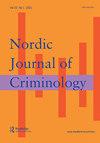Violating trust: a study of court verdicts in cases of gambling-driven economic crimes in the workplace
Q2 Social Sciences
引用次数: 0
Abstract
ABSTRACT This study investigated trust-violating economic crimes committed in businesses and at public and non-profit organizations by employees with problem gambling. Verdicts delivered by the Swedish general courts over a five-year period (N = 283,884) were subject to a keyword search, and verdicts matching the search criteria (n = 1,232) were examined in detail, identifying 62 such cases. A notable finding was that middle-aged women with no previous criminal record were overrepresented compared with women in national statistics on crimes in general. Non-profit organizations and public services were relatively ineffective in detecting gambling-driven trust-violating crimes. The implications of our findings for criminological theory are discussed; the results lend support to Donald Cressey’s theory of trust-violating crime as driven by a non-shareable problem and agree with the ‘fraud triangle’ conceptualization. We conclude that although these gambling-driven crimes are relatively rare, the risk of them occurring should not be ignored by businesses and organizations as the consequences can be severe and, for small businesses, sometimes devastating.违反信任:对工作场所赌博驱动的经济犯罪案件的法院判决的研究
摘要本研究调查了在企业、公共和非营利组织中从事问题赌博的雇员所犯的违反信任的经济犯罪。对瑞典普通法院5年间(N = 28.3884万件)的判决书进行了关键词检索,对符合检索标准的判决书(N = 1232件)进行了详细分析,确定了62件。一项值得注意的发现是,与一般国家犯罪统计数字中的妇女相比,没有犯罪记录的中年妇女所占比例过高。非营利组织和公共服务机构在发现赌博驱动的违反信托犯罪方面相对无效。讨论了我们的研究结果对犯罪学理论的影响;研究结果支持了Donald Cressey的违反信任犯罪理论,该理论是由一个不可分享的问题驱动的,并同意“欺诈三角”的概念。我们的结论是,尽管这些赌博驱动的犯罪相对罕见,但企业和组织不应忽视它们发生的风险,因为后果可能是严重的,对小企业来说,有时是毁灭性的。
本文章由计算机程序翻译,如有差异,请以英文原文为准。
求助全文
约1分钟内获得全文
求助全文

 求助内容:
求助内容: 应助结果提醒方式:
应助结果提醒方式:


